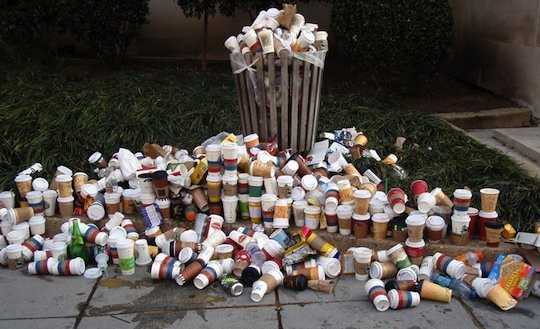LONDON, UK – An estimated 2.5 billion disposable coffee cups are used in the UK each year, creating around 25,000 tonnes of waste. In March the Government’s Environmental Audit Committee launched an inquiry into the impact of cup waste.
This has prompted the need for a sustainable solution to their disposal and recycling.
The difficulties in recycling paper coffee cups are two-fold – in their composition and in any contaminants. To make paper cups waterproof, card is fused with polyethylene, a material that is difficult to separate from the card.
In addition, some discarded coffee cups are used as mini litter bins and contaminated with discarded food. For these reasons most disposable paper coffee cups are sent with other general waste to landfill or taken to local waste energy plants for conversion into refuse derived fuel (RDF) to generate electricity.
In an innovative new scheme involving a partnership between Bywaters, Facilities Management partners Sodexo and Tenon Group and UCL, students at UCL are being given the opportunity to make a sustainable difference to the way in which used paper coffee cups are processed.
The scheme is a two month pilot which, it is hoped, will confirm the viability of rolling out a permanent paper coffee cup recycling service. Various factors are to be assessed including what mixture of cups are to be collected, weekly quantities, cost of logistics and how to remove contaminants.
The scheme is to include all paper coffee cups, paper soft drink cups, paper vending machine cups, and paper water fountain cups from UCL’s buildings in central London.
Bywaters is to provide the logistics and collection of paper coffee cups to be converted into high-end products such as shopping bags and perfume boxes.
Bywaters will collect the designated bins then bale up all paper coffee cups to a mill where they will be pulped and the polymer plastic liner separated so all the paper fibre can be recovered and recycled.
Paper cups tend to contain a very high grade of paper and this trial will allow recovery of the paper cups as high grade paper, which has a higher value than lower grades.
Hannah Biggs from UCL said: “Our sustainability team has worked with student communications to design posters and circulate key messages around UCL to encourage staff and students to use the designated paper coffee cup recycling bins located around UCL’s buildings. We are proud to be working with Bywaters in spearheading a straightforward scheme like this which could have such a positive effect on London’s environment.”
Bywaters’ Materials Recovery Facility (MRF) in East London is capable of processing up to 650,000 tonnes of material a year, recovering over 95% of collected materials including plastics and paper. The company’s aim to help all clients achieve at least 80-90% of their recycling targets through continuous innovation.
John Glover, Managing Director of Bywaters, said: “This particular initiative of recycling UCL’s paper coffee cups is all about changing attitudes and behaviours to increase UCL’s recycling rates. We have a specially-trained team of ”Green Gurus” who are embedded on client sites to help our clients and their staff to adopt new practices in sustainability, recycling and waste management. The waste industry in general has a bad name and we want to change all that with our higher standards of professionalism through consultancy and training.”
Darrel Moore















